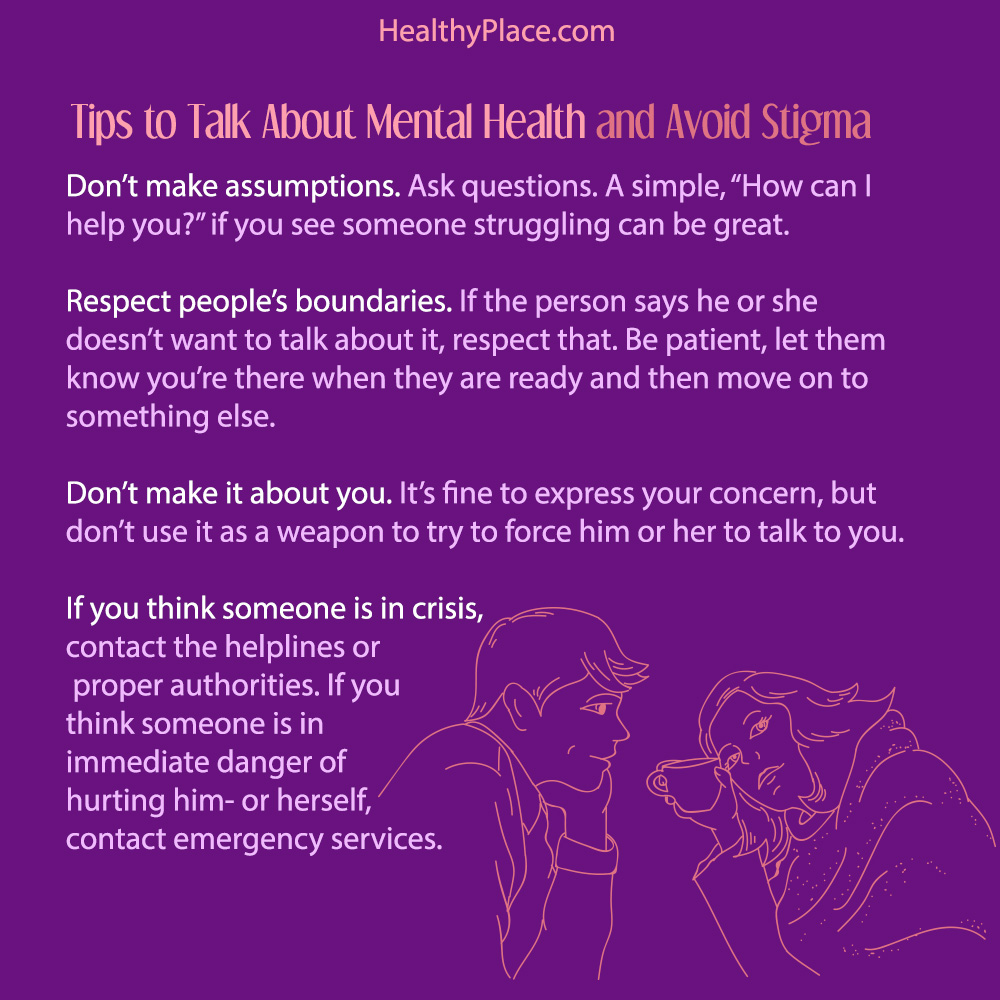How to Talk About Mental Health With Loved Ones
Some people aren’t sure where to start when they want to talk about mental health or illness with a loved one. Knowing how to talk about mental illness is important, but broaching the subject can be difficult for all parties involved. Whether you’re on the mental illness or mental wellness side of the equation, stress over the talk can lead to not having the conversation at all or going about it all the wrong way. Is there a good way to talk about mental health?
Even when it involves a friend, family member, or someone else you feel you know really well, the idea of asking about his or her mental illness can be extremely daunting; you worry about saying the wrong thing when you don’t mean to. Speaking from the mental illness side of things, these are some tips for how I’d want to be approached about my mental illnesses that I think could be helpful for others, too.
Tips to Talk About Mental Health and Avoid Stigma
Don’t make assumptions. Ask questions.
This one goes for whether the person is a loved one or not. I’d much rather someone ask a question than stare at me for my skin picking or give me unsolicited advice when I’m feeling depressed or anxious. A simple, “How can I help you?” if you see someone struggling can be great, or if you’re interested in learning more about someone’s disorder, ask him or her to share about it. If he or she is not comfortable sharing, ask if there are any recommended resources to look at. Clarify that you’re not trying to be invasive, but, rather, are looking for ways to better understand and/or offer support.
Respect people’s boundaries.
If the person says he or she doesn’t want to talk about it, respect that. There are numerous reasons people might not be willing to discuss their mental illnesses, including not being in a good state of mind, feeling ashamed, or feeling scared. Maybe it’s just something they'd prefer you not to know about anyway or they’re not ready to share. Be patient, let them know you’re there when they are ready and then move on to something else.
Don’t make it about you.
I find that people are prone to start saying how things are hurting or upsetting them in these situations. For instance, say you’re talking to your college student about his or her mental illness and he or she doesn’t want to share, don’t then turn around and go on about how it upsets you that he or she won’t open up to you. It’s fine to express your concern, but don’t use it as a weapon to try to force him or her to talk to you.
If you think someone is in crisis, contact the helplines or proper authorities.
In my area of Ontario, we have, through the local branch of the Canadian Mental Health Association, a local distress center, the local health system, and the regional police force, a Crisis Outreach and Support Team (COAST). With the guidance of these four entities, COAST responds to crisis calls and, if needed, will dispatch a mobile outreach team to further assess the person in crisis. COAST also offers continued telephone support and referrals to follow-up services.
I know not everywhere has something like this, but crisis lines are pretty common and can be extremely valuable resources for those with mental illness and their loved ones.
If you think someone is in immediate danger of hurting him- or herself, contact emergency services.
It can be a hard judgment call to make, but if you’re legitimately concerned about this, it’s better safe than sorry (How to Help a Suicidal Person).

APA Reference
Barton, L.
(2017, August 14). How to Talk About Mental Health With Loved Ones, HealthyPlace. Retrieved
on 2026, March 5 from https://www.healthyplace.com/blogs/survivingmentalhealthstigma/2017/08/how-to-talk-to-loved-ones-about-their-mental-health
Author: Laura A. Barton
So glad to see this read. I think this might be one of the hardest situations to approach. We can feel a lot of insecurity and anxiety when facing issues in a relationship and openly discussing our mental illness for the first time can be a nerve-wracking experience. These are some wonderful tips and suggestions and makes it feel much more natural and approachable.

